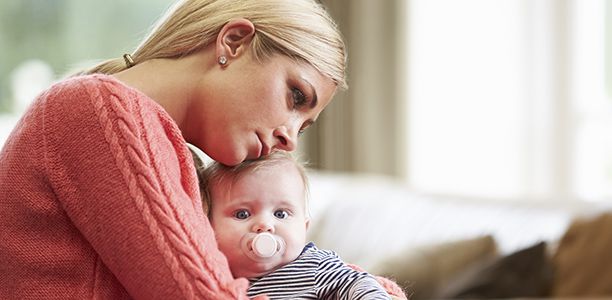Jane Davidson realised she had a problem when the ocean started to look like the welcoming embrace of death.
“Every day I used to walk along the beach front where I live and I thought: ‘I just want to go and drown in the ocean’,” she says.
The social worker from Sydney’s northern beaches was six weeks into being a new mother. Her son, William, was chronically ill with a then-undiagnosed milk protein intolerance.
Davidson cried every day; she wept from shame, from a sense of hopelessness.
“For me, at about the six-week mark, that’s when things really started to crumble. I felt really hopeless, really ashamed, that I was a really dreadful mother, that my son would be better off with another mother,” she says. “I felt like my life was over.”
It is estimated about 15% of new mothers experience postnatal depression, and 3% are severely affected. About 1% are admitted to hospital, according to recent studies in NSW, a number that will only increase with improvements in access to health services.
But despite the huge impact on mothers and their families, little is known about the condition’s causes.
Dr Fenglian Xu, a researcher in the health faculty at the University of Technology, Sydney (UTS), aims to change that.
She is embarking on a three-year study to identify the physical drivers of mental health problems in mothers after the birth of a child.
Dr Xu hopes the research will lead to the development of a system to help prevent postpartum depression, which has been a growing problem in NSW, particularly since 2005.
“It’s not easy to control, so preventing it is very important,” she says.
“This is a big public health issue – and what we’re seeing is only the tip of the iceberg.
“This problem impacts not [only] the mother’s future, but the children and the family.”
Using public health data from across the state, Dr Xu will examine the relationship between postnatal depression and hospital emergency department visits during pregnancy.
If a woman presents to an emergency department even once during pregnancy, she is more likely to experience postnatal depression, Dr Xu says.
But nutritional deficiencies may also play a part. Dr Xu will study the association between nutritional anaemia (caused by a deficiency of iron or vitamin B12) and postnatal depression.
She will also look into the presence of infectious diseases, any history of chronic illness, such as diabetes, and the partner’s or husband’s health.
“I am focused on physical problems before the birth,” Dr Xu says.
The profile of new mothers who develop postnatal depression is complex. Older mothers and those who do not, or can not, breastfeed are more likely to be affected. Women born in Australia also have a higher recorded chance of developing the condition compared with their overseas-born counterparts, although the latter group is less likely to use hospital services.
The most socioeconomically disadvantaged mothers are also less likely to be admitted to hospital for mental health issues after birth, which Dr Xu says is probably due to a lack of access to services.
Smoking, elective caesarean section, and significant health problems for the baby requiring admission to intensive or special care units are also related to major depressive disorders before and after birth, Dr Xu’s previous research has shown.
“We know that one in seven new mums and up to one in 10 new dads in Australia are now diagnosed with postnatal depression,” says the chief executive of the Post and Antenatal Depression Association (PANDA), Terri Smith.
“This number is likely to be higher [when we take into account] those who do not seek a diagnosis or support.”
The key to dealing with the illness is to ask for help as soon as there are symptoms, Smith says.
“Symptoms can include feeling sad, anxious or teary, irritability, changes in appetite, sleep problems not related to baby’s sleep, feeling guilty, worthless or numb, fear of being alone, fear of baby, withdrawing socially and/or not looking after yourself, difficulty concentrating or thinking clearly, agitation, [and] thoughts of harming yourself or your baby,” Smith says.
Jane Davidson, whose son is now 5½, says she sought help much more quickly with her second child, Meg, who is three.
Her first-born was three months old before she found a way to overcome her shame and call her GP.
“The shame factor is absolutely massive,” she says. “I didn’t want to be that mum that couldn’t cope. There’s still a lot of judgment around postnatal depression.”
Davidson, who treated her illness with medication and counselling, is now considering having a third child.
(Source: University of Technology, Sydney)










